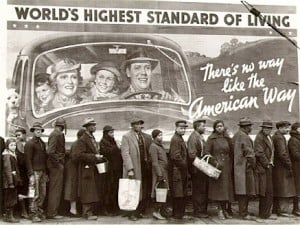
In 2014, 46.7 million people (14.8%) were living in poverty, according to the Census Bureau. The poverty rate for people aged 65 and older was lower, at 10%, thanks to the success of earned benefit programs like Social Security and Medicare. In spite of these programs’ undeniable success in providing improved income and health security for older Americas, GOP leaders in Congress and most running for President, continue to target Social Security and Medicare for cuts. They also have supported cuts to other vital safety net programs serving America’s poor.
While this weekend’s GOP Poverty forum may have signaled a shift to softer rhetoric on poverty (an issue that has seldom been addressed by Republican candidates, so far) there’s no sign that their policy prescriptions have changed at all.
Robert Greenstein is the founder and President of the Center on Budget and Policy Priorities and provides this Huffington Post analysis of the GOP’s primary poverty proposal:
“Our analysis suggests Paul Ryan’s “Opportunity Grant” proposal carries substantial risk of increasing poverty, rather than reducing it, for the following reasons:
- Although Speaker Ryan has described the proposal as maintaining the same overall funding for anti-poverty programs, that would be a practical impossibility.
- Funds would likely be shifted away from direct assistance to needy families.
- The proposal would jeopardize basic nutrition assistance for poor children, which research has shown reduces child malnutrition and improves children’s long-term prospects.
- Not only would food assistance funding likely decline, but total funding to assist low-income families would likely decline as well.
- History shows that when federal policymakers merge programs into a broad block grant, federal funding typically declines over time, often dramatically.”
Economist Jared Bernstein says:
“This is merely a gussied up version of “if your only tool is a hammer, then everything looks like a nail.” The idea, and Ryan’s budgets very much underscore this point, is that we can help the poor more by doing less for them.
The evidence points strongly in the opposite direction. As CBPP’s Arloc Sherman noted yesterday (and Ben Spielberg and I have explained in detail), a large and growing body of high-quality research…shows that the impact of income support and safety net programs like SNAP and Medicaid do not just occur upon receipt and immediately fade away. They have important, positive long-term benefits for children. Next, the idea that liberal policies have failed is belied by…you know…data.”
Paul Ryan’s long-held and often-expressed Ayn Randian view of every man for himself and claims that federal safety-net programs (including earned benefits in Social Security, Medicare) only provide a “hammock” for the “dependency culture” of “makers and takers” remain as the core value that fuels the GOP approach to poverty. Although, Speaker Ryan now acknowledges his “maker-taker” rhetoric was a mistake, that clearly hasn’t moderated his policy approach.
“Under his “Opportunity Grant” proposal, Ryan has proposed converting a number of programs to state block grants, a decision that nonpartisan analysis suggests would reduce families’ ability to access key programs such as nutrition and housing assistance. In crafting this idea, Ryan and other conservatives often point to the Temporary Assistance for Needy Families program as a model—even though it does very little to mitigate poverty and hardship and is unresponsive to recessions.
Furthermore, in their most recent congressional budgets, Republicans obtained two-thirds of their cuts from programs helping low- and moderate-income families, while channeling additional resources towards tax cuts for the wealthy.” The Nation
The GOP/Ryan budgets have all been characterized by tax cuts for the wealthy, program cuts for the poor and turning Medicare into “Coupon Care.”
“Once again, the House GOP’s budget would privatize Medicare with a voucher plan, leaving seniors and the disabled – some of our most vulnerable Americans – hostage to the whims of private insurance companies. Over time, this will end traditional Medicare and make it harder for seniors to choose their own doctor. Vouchers will not keep up with the increasing cost of health insurance… that is why seniors will pay more.”…Max Richtman, NCPSSM President/CEO
The GOP/Ryan Budget:
- Ends the Medicaid joint federal/state financing partnership and replacing it with fixed dollar amount block grants, giving states less money than they would receive under current law.
- Repeals Medicaid expansion. Since 2014, states have had the option to receive federal funding to expand Medicaid coverage. Over half of the states have expanded their Medicaid programs, and others will likely do so in the future. Repealing this option would result in at least 14 million people losing their Medicaid coverage and state Medicaid programs would lose a total of $900 billion over 10 years.
- Cuts Medicare by $431 billion over ten years. Over half of Medicare beneficiaries had incomes below $23,500 per year in 2013, and they are already paying 23 percent of their average Social Security check for Medicare cost-sharing in addition to out-of-pocket costs.
Talking about poverty in America is a welcome first step from the Republican candidates; however, talk is cheap if action is just more of the same benefit cuts to pay for tax cuts.



